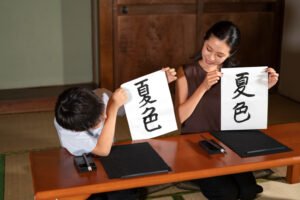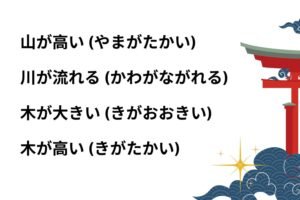- Call : +91 800 710 1970
- |
- contact@satoriquest.com
About Us
Your Pathway to Japanese Fluency and Beyond
Onkar, the founder of SatoriQuest Academy, combines expertise in language, technology, and chess. With over a decade of Japanese teaching experience and a deep passion for the language, he has studied Japanese for many years. His academic background includes a PG Diploma in Data Science from IIIT-B and an MS in Data Science from Liverpool University. Onkar has also worked in the IT industry, collaborating with Japanese clients and bridging cultural and business gaps. His knowledge of Data Science, AI, and NLP offers students valuable insights into technology trends.
Alongside his tech and language skills, Onkar is an International FIDE-rated Chess player with a rating of 1649, having competed in national and international tournaments. He has developed advanced study materials to help his chess students grow. Onkar is also a published author, with a debut novel recognized at the National Book Fair in Delhi. This unique combination of tech, chess, and Japanese language forms the foundation of SatoriQuest Academy, where students benefit from Onkar’s diverse expertise and guidance.




About Us
Your Pathway to Japanese Fluency and Beyond
Onkar, the founder of SatoriQuest Academy, combines expertise in language, technology, and chess. With over a decade of Japanese teaching experience and a deep passion for the language, he has studied Japanese for many years. His academic background includes a PG Diploma in Data Science from IIIT-B and an MS in Data Science from Liverpool John Moores University. Onkar has also worked in the IT industry, collaborating with Japanese clients and bridging cultural and business gaps. His knowledge of Data Science, AI, and NLP offers students valuable insights into technology trends.
Alongside his tech and language skills, Onkar is an International FIDE-rated Chess player with a rating of 1649, having competed in national and international tournaments. He has developed advanced study materials to help his chess students grow. Onkar is also a published author, with a debut novel recognized at the National Book Fair in Delhi. This unique combination of tech, chess, and Japanese language forms the foundation of SatoriQuest Academy, where students benefit from Onkar’s diverse expertise and guidance.

Vision
To be a leading educational platform that bridges cultural and linguistic gaps, enabling students to master Japanese language skills while enhancing their personal and professional lives. SatoriQuest Academy aspires to shape global citizens who are equipped to succeed in a rapidly evolving, interconnected world.

Mission
To empower students through personalized and engaging Japanese language education, fostering cultural understanding, cognitive growth, and professional development. At SatoriQuest Academy, we aim to create transformative learning experiences that connect students with Japan’s rich heritage and global opportunities.
Why Learn Japanese





Japan is a leader in industries like IT, technology, and business. Mastering Japanese gives you an edge in these fields, opening doors to multinational companies, cutting-edge tech, and global business landscapes.

Japanese proficiency is in high demand in sectors like translation, interpretation, and international relations. Whether you aim to work with Japanese companies or connect businesses across borders, being bilingual in Japanese provides valuable career leverage.

With Japan being a global economic powerhouse, knowing the language can strengthen business ties, giving you access to opportunities for direct collaboration, negotiations, and fostering cross-cultural business relationships.

Japanese is more than a language; it’s a gateway to a rich cultural heritage. Whether it’s travel, historical exploration, or forming deeper connections with Japanese communities, fluency in Japanese enriches your personal journey, offering insights into a fascinating world.

Learning Japanese isn’t just about acquiring a new language—it’s about enhancing your cognitive abilities, boosting problem-solving skills, and gaining fresh perspectives on how different cultures think and communicate.





Key Role in Global Industries
Japan is a leader in industries like IT, technology, and business. Mastering Japanese gives you an edge in these fields, opening doors to multinational companies, cutting-edge tech, and global business landscapes.

Career in Translation & Interpretation
Japanese proficiency is in high demand in sectors like translation, interpretation, and international relations. Whether you aim to work with Japanese companies or connect businesses across borders, being bilingual in Japanese provides valuable career leverage.

Strengthening Business Relations with Japan
With Japan being a global economic powerhouse, knowing the language can strengthen business ties, giving you access to opportunities for direct collaboration, negotiations, and fostering cross-cultural business relationships.

Cultural Exploration & Travel
Japanese is more than a language; it’s a gateway to a rich cultural heritage. Whether it’s travel, historical exploration, or forming deeper connections with Japanese communities, fluency in Japanese enriches your personal journey, offering insights into a fascinating world.

Cognitive Growth and New Perspectives
Learning Japanese isn’t just about acquiring a new language—it’s about enhancing your cognitive abilities, boosting problem-solving skills, and gaining fresh perspectives on how different cultures think and communicate.
Check out our founder’s innovative teaching ideas

Anchor Words
Begin with an easy-to-remember “anchor word” that connects visually to other words, building a web of related vocabulary. This helps learners remember words through associative imagery and spatial placement.

Cultural Tie-In
Link each word with unique cultural references to deepen learners’ associations. This creates a memorable connection beyond mere vocabulary.

Quick-Fire Pattern Practice
Practice phrases with familiar vocabulary in a pattern format. This approach strengthens learners’ abilities to recognize and manipulate simple sentence structures.

Advanced Learners - Anchor Word Web
For advanced learners, select an abstract anchor word, and create a web with complex, nuanced vocabulary. This builds depth in their understanding of words within different contexts.

Quick-Fire Pattern Practice with Advanced Grammar
Create sentences using advanced grammar structures. This helps learners recognize subtle meaning changes and adapt language with precision.

Kanji Puzzle Blocks Method
Break down complex kanji into radicals or components to understand its structure visually. This method promotes understanding of kanji formation and improves recall.





